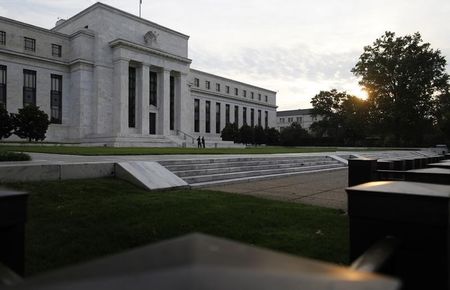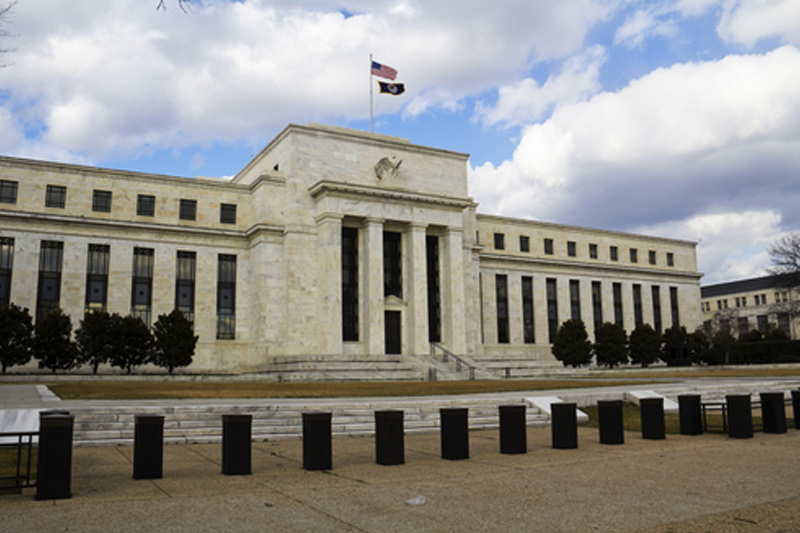By Mike Peacock LONDON (Reuters) - Unless it springs a major surprise, the U.S. Federal Reserve will call time this week on its program of government bond purchases, which at one point was pumping $85 billion a month into financial markets and the economy.
James Bullard, who heads the St. Louis Fed, has suggested that sticking with bond purchases for a few more months would give policymakers time to assess a deteriorating inflation outlook.
That helped markets to calm from a violent sell-off 10 days ago but economists expect the Fed to turn off its money taps on schedule on Wednesday, while giving accompanying assurances that it will respond if a global downturn threatens its economy.
"We remain optimistic that the recent upshift from 2 percent to 3 percent growth will be sustained," economists at Bank of America Merrill Lynch said in a note.
It may well be that the Fed keeps U.S. interest rates virtually at zero for longer given tumbling energy prices and an absence of wage growth. Investors have already pushed expectations for an initial rate rise back several months to late next year.
Global concerns are centered on the extent of China's slowdown and the malaise in the euro zone, over which the specter of deflation still hovers.
Results of stress tests on European banks, announced on Sunday, showed 25 banks had failed as of the end of 2013 but most have since repaired their finances.
The European Central Bank has staked its reputation on this exercise, hoping it will draw a line under years of financial and economic turmoil. But whether it leads to a resurgence of bank lending is uncertain given the euro zone's economic doldrums.
"Thinking that lending somehow can lead GDP is an illusion, and I don't know how that has somehow crept into the policy debate," said Erik Nielsen, chief global economist at Unicredit.
"Businesses need to believe in an increase in the demand for their products before asking for credits, and now that external demand growth is no longer there, this is when the euro zone needs demand stimulus."
Euro zone inflation data in the week to come will show whether the threat of deflation has eased at all. The consensus is for the headline rate to have edged up to 0.4 percent in October but that will bring little comfort.
Germany's Ifo sentiment survey will give a glimpse of how things are going for Europe's largest economy in the last three months of the year. It contracted in second quarter and is unlikely to have done a lot better in the third.
ECB'S SHOULDER TO THE WHEEL
The ECB's three-pronged plan to push money into the faltering economy involves offering banks new cheap long-term money on the condition that they lend it on, coupled with purchases of covered bonds and asset-backed securities.
Reuters exclusively reported last week that the ECB may also buy corporate bonds but there is no certainty that the combined effort will do enough to lift growth and inflation.
Full-on quantitative easing of the sort the Fed is now winding up remains politically difficult to countenance.
On Monday the ECB will announce how many covered bonds, which are backed by high-quality assets so holders may be reluctant to give them up, it bought in its first week in the market.
The euro malaise has intensified a debate about debt-cutting over growth-boosting spending.
The European Commission has until Wednesday to decide whether to throw back France's draft 2015 budget after Paris said it would not meet EU deficit limits until 2017.
Paris has said it will not accept demands for deeper cuts than already planned. Italy is making a similar case.
The hope is that a renewed French and Italian commitment to economic reforms will persuade Germany to loosen its purse strings and the ECB to act more forcefully.
But Germany continues to rebuff suggestions that it should increase public spending and insists it will balance its budget next year for the first time since 1969 despite the fact it is flirting with recession.
People familiar with its deliberations said the Bank of Japan, which has tried for two decades to banish deflation, will resist pressure at this week's policy meeting for more stimulus measures or to accept that its inflation target is unrealistically high.
It is preparing to roughly halve its 1 percent economic growth forecast for this fiscal year, but will stick to its prediction that inflation will hit its 2 percent target in the year from next April.
Having spent $15 billion of its reserves trying, and largely failing, to underpin the rouble, Russia's central bank faces a difficult policy decision on Friday.

There is growing speculation it may soon raise rates to support the rouble, which is being hit by plunging oil prices and Western sanctions imposed over the Ukraine crisis.
(editing by David Stamp)
